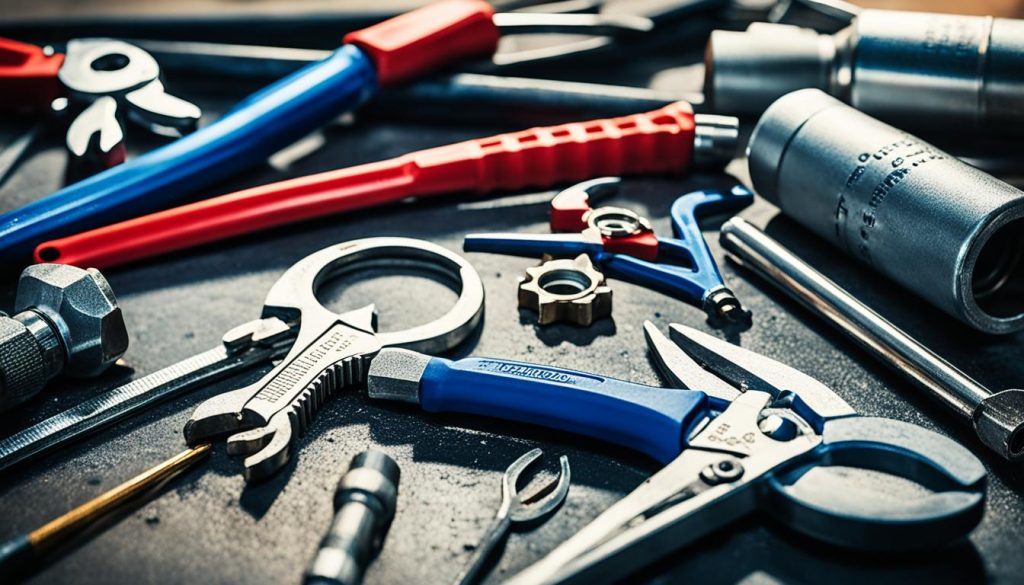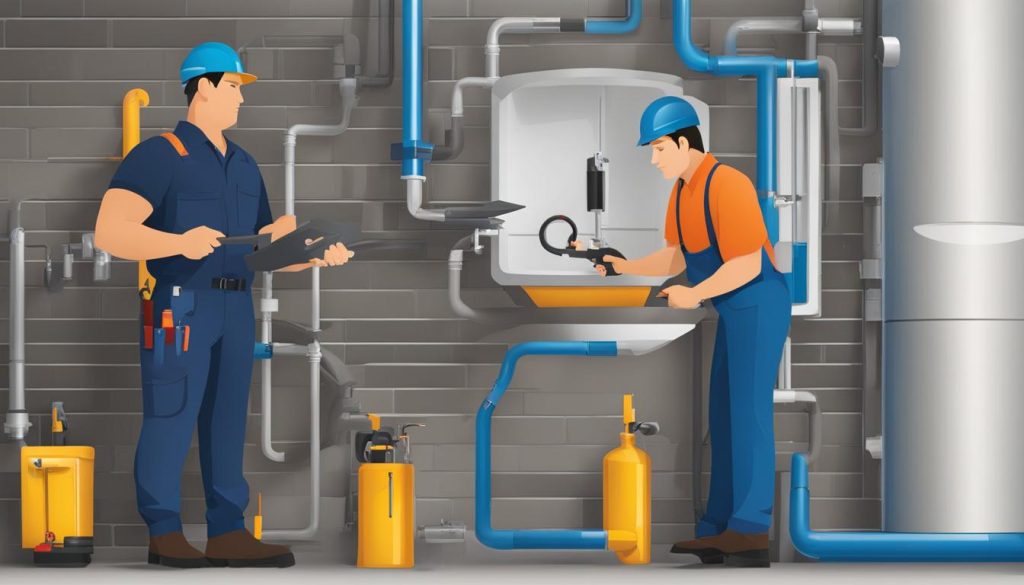Plumber vs Electrician Salary: Earnings Compared
Did you know that the average salary for electricians in Canada is approximately $65,000 per year, while plumbers make a median salary of around $60,000 annually? These figures highlight the competitive earning potential in both professions, making them attractive career choices for individuals seeking financial stability and growth.
When comparing plumber vs electrician salary, it’s important to consider factors such as location, experience, and industry. These variables can significantly impact the actual earnings of professionals in each field. However, with seniority and a solid reputation, there is an opportunity for increased pay in both trades.
Key Takeaways:
- Electricians in Canada earn an average salary of around $65,000 per year.
- Plumbers in Canada make a median salary of approximately $60,000 annually.
- Location, experience, and industry can influence the actual earnings of plumbers and electricians.
- Both professions offer good earning potential with opportunities for increased pay with seniority and reputation.
- Choosing between a career as a plumber or an electrician depends on individual preferences, interests, and skills.
A Typical Day in the Life of an Electrician
As an electrician, my typical day revolves around working with electrical systems, ensuring their proper functioning, and carrying out various tasks related to electrical work. Let me give you a glimpse into what a day in the life of an electrician looks like.
Job Duties and Responsibilities
As part of my job, I am responsible for interpreting blueprints and technical diagrams to understand the electrical layout of a building or project. This helps me pinpoint and repair any discrepancies in the electrical plans. Safety testing and troubleshooting are crucial aspects of my daily tasks to ensure that the electrical systems are operating safely and efficiently.
I also perform general electrical maintenance, which includes checking, repairing, and replacing faulty wiring, outlets, and fixtures. This maintenance work helps prevent electrical malfunctions and ensures the safety of the occupants. Additionally, I might work closely with building or engineering companies to assist with project design and offer expertise on electrical systems.
Working Hours and Overtime
Electricians typically work an eight-hour day, but there may be instances when overtime is required to meet project deadlines or address emergencies. Time flexibility plays a vital role in handling electrical work efficiently, as certain tasks might require extended hours or immediate attention.
A Day in the Life
Now, let’s dive into a typical day in the life of an electrician:
- In the morning, I start my day by reviewing my work schedule and planning out the tasks for the day.
- I collect the necessary tools and equipment, ensuring that everything is in proper working condition.
- Arriving at the job site, I meet with clients or project managers to discuss the scope of work and any specific requirements.
- I examine the electrical systems and premises, assessing any issues or areas that require attention.
- Interpreting blueprints and technical diagrams, I identify the location of electrical components and plan the necessary steps for repairs or installations.
- I carry out electrical maintenance tasks, such as replacing faulty wiring, installing new outlets, or fixing electrical fixtures.
- Safety testing and troubleshooting are critical parts of my day, ensuring that the electrical systems are functioning properly and meeting safety regulations.
- I document all the work completed, including any repairs made, tests conducted, and materials used.
- Throughout the day, I prioritize communication and collaboration with team members, clients, and other professionals involved in the project.
- At the end of the day, I clean up the work area and organize my tools for the next day’s tasks.
Being an electrician requires technical expertise, attention to detail, and the ability to problem-solve in a fast-paced environment. It’s a rewarding profession that offers opportunities to contribute to various projects and ensure the safe functioning of electrical systems.
A Typical Day in the Life of a Plumber
As a plumber, my day is filled with a variety of tasks and responsibilities that keep me busy and engaged. Whether I’m working on residential or commercial projects, my main goal is to ensure that plumbing systems are installed, maintained, and repaired efficiently.
Each day starts with analyzing blueprints and building plans to understand the layout of the plumbing systems. This helps me determine the best course of action and prepare for the tasks ahead.
One of the primary tasks I carry out on a daily basis is installing cold and hot water systems. This involves connecting pipes, valves, and other fixtures to ensure a reliable supply of water. I also install fixtures like sinks, toilets, showers, and gas stoves, making sure they are properly connected and functioning correctly.
Maintaining pipes is another important aspect of my role. I regularly inspect and assess the condition of the pipes to identify any leaks or damages. If any issues are found, I promptly repair or replace the damaged sections to prevent further complications.
In addition to routine tasks, I also handle plumbing emergencies. Whether it’s a burst pipe, a clogged drain, or a malfunctioning water heater, I respond quickly to resolve the issue and minimize any potential damage.
I also dedicate time to inspecting drainage systems to ensure they are functioning properly. This involves checking for blockages, leaks, or any other issues that may hinder the proper flow of wastewater.
Overall, a typical day as a plumber involves a combination of physical work, problem-solving, and attention to detail. It’s a rewarding profession that allows me to make a difference in people’s lives by providing them with essential plumbing services.
Training Duration for Plumbers and Electricians
When considering a career in the skilled trades, one of the important factors to consider is the training duration. The time you invest in acquiring the necessary skills and knowledge will determine how quickly you can enter the workforce and start building your career. At the Skilled Trades College of Canada, both plumber and electrician training programs are designed to provide comprehensive education and hands-on experience in a shorter duration, allowing you to kickstart your career sooner.
For aspiring plumbers and electricians, the training programs at the Skilled Trades College of Canada are designed to be completed in just 12 weeks. These programs include pre-apprenticeship training, which equips you with the fundamental skills and knowledge required to excel in your chosen trade.
During the 12-week period, you will learn the theoretical aspects of your trade, including technical concepts, safety regulations, and industry standards. You will also have the opportunity to gain real-world experience through practical training, where you will apply your knowledge in simulated work environments, ensuring that you are well-prepared for the demands of the job.
By condensing the training duration to 12 weeks, the Skilled Trades College of Canada provides a fast-track to a rewarding career in plumbing or electrical work. The comprehensive programs ensure you receive a well-rounded education and hands-on experience, allowing you to develop the skills and confidence necessary to thrive in the industry.
With the efficient training programs offered by the Skilled Trades College of Canada, you can accelerate your entry into the plumbing or electrical trade. By dedicating a focused period of time to your training, you can facilitate your transition into a fulfilling career, where you can apply your skills and contribute to various projects and industries.
Training Program Overview:
| Training Duration | Program |
|---|---|
| 12 weeks | Plumber Training Program |
| 12 weeks | Electrician Training Program |
The Skilled Trades College of Canada offers flexible training programs that fit into your busy schedule. Whether you are considering a career change or are just starting your journey in the trades, the 12-week programs provide an efficient pathway to gain the skills and qualifications needed for success in the plumbing or electrical industry.
Essential Skills Needed for Plumbing
As a plumber, honing specific skills is crucial for success in your profession. From mathematical abilities to problem-solving skills, here are the essential skills necessary to become a skilled plumber.
1. Mathematical Skills
Plumbing often involves calculations and measurements, making mathematical skills indispensable. Plumbers need to understand various plumbing concepts, such as pipe sizing, water pressure, and flow rate. Basic math capabilities enable plumbers to accurately analyze and solve plumbing problems.
2. Manual Dexterity and Physical Strength
Plumbers regularly work with heavy parts and equipment that require physical strength and manual dexterity. The ability to handle and maneuver various tools, fittings, and pipes is essential for effectively installing and repairing plumbing systems. Manual dexterity enables plumbers to work efficiently and with precision, ensuring reliable and durable results.
3. Problem-Solving and Troubleshooting Abilities
Plumbers encounter a wide range of plumbing issues that require problem-solving and troubleshooting skills. Whether it’s diagnosing leaks, identifying clogs, or resolving drainage problems, plumbers must approach each situation with analytical thinking and find effective solutions. Quick thinking and the ability to adapt to unexpected challenges are crucial in the fast-paced world of plumbing.
4. Administrative Skills
In addition to hands-on plumbing tasks, administrative skills play a significant role in a plumber’s day-to-day operations. Plumbers often handle paperwork such as permits, contracts, and invoices. They may also need to communicate with clients and suppliers, manage schedules, and prioritize tasks effectively. Effective administrative skills contribute to a well-organized and successful plumbing business.
Summary
Plumbing requires a diverse range of skills, including mathematical abilities, manual dexterity, problem-solving capabilities, and administrative aptitude. Mastering these essential skills will empower plumbers to excel in their profession and provide high-quality plumbing services.

Essential Skills Needed for Electrical Engineering
Being an electrician requires a specific set of skills to excel in the field. In addition to technical knowledge and expertise, electricians must possess various other abilities, including:
- Advanced mathematical skills: Electricians need to have a solid foundation in advanced mathematics, including algebra and trigonometry. These skills are essential for calculating voltages, currents, and power in electrical systems.
- Practical experience: Practical experience is crucial for electricians to effectively handle precision tasks and work calmly in various situations. Hands-on experience provides valuable insights into electrical systems and enhances problem-solving abilities.
- Problem-solving skills: Electricians must be adept at identifying and resolving electrical issues. They need strong analytical and problem-solving skills to tackle complex electrical problems and ensure the smooth functioning of electrical systems.
- Organization skills: Managing large projects and meeting deadlines is a vital aspect of electrical engineering. Electricians need excellent organization skills to plan and execute their work efficiently, ensuring that all tasks are completed on schedule.
Having these skills is essential for electricians to deliver high-quality work and maintain the safety and functionality of electrical systems. Whether they are handling repairs, installations, or maintenance, these skills enable electricians to excel in their profession.
| Skill | Description |
|---|---|
| Advanced Mathematical Skills | Electricians need strong math skills to calculate voltages, currents, and power in electrical systems. |
| Practical Experience | Hands-on experience helps electricians handle precision tasks and work calmly in various situations. |
| Problem-solving Skills | Electricians must possess excellent problem-solving skills to tackle complex electrical issues and ensure system functionality. |
| Organization Skills | Effective organization skills are crucial for managing large projects and meeting deadlines in electrical engineering. |
Salary Comparison by Country: Plumbers vs Electricians
The salary of plumbers and electricians can vary significantly from country to country. Here is a comparison of average salaries for these professions in different parts of the world:
| Country | Electrician Salary | Plumber Salary |
|---|---|---|
| United States | $56,101 per year | $57,199 per year |
| Australia | £47,415 per year | £43,949 per year |
It’s important to note that these figures represent average salaries and can vary based on factors such as experience, location, and industry. When comparing salaries between countries, it’s also crucial to consider the cost of living index. A higher salary may not necessarily translate to a higher standard of living if living expenses are significantly higher in a particular country.
As seen in the data, there are differences in average salaries for plumbers and electricians across various countries. These variations can be attributed to factors such as demand, industry regulations, and local economic conditions.
Conclusion: Choosing Between a Career as a Plumber or an Electrician
When considering a career choice between becoming a plumber or an electrician, it ultimately comes down to your personal preferences, interests, and skills. Both professions offer attractive earning potential, job stability, and opportunities for growth in the skilled trades industry.
As a plumber, you’ll be working closely with water systems and plumbing fixtures, while electricians deal with electrical systems. Each trade has its unique set of skills and responsibilities. Plumbers analyze blueprints, install and maintain pipes, and resolve plumbing emergencies. Electricians interpret technical diagrams, conduct safety tests, and troubleshoot electrical issues.
To make an informed decision, consider your personal aptitudes, career goals, and long-term job satisfaction. Reflect on whether you enjoy working with water or electricity, problem-solving, physical labor, or administrative tasks. By evaluating these factors, you can determine which trade aligns best with your interests and offers the most fulfillment.
Both plumbing and electrical work are essential components of our daily lives, and skilled trades professionals in these fields are in high demand. With the right training and experience, you can establish a successful and rewarding career as a plumber or an electrician, contributing to the infrastructure and well-being of communities across Canada.
- Investing Wisely: How Windows & Doors in Boost Property Value and Financial Health - April 24, 2025
- The Financial Impact of Personal Injuries: Why Legal Help Matters for Business Owners - April 16, 2025
- The Hidden Financial Costs of Domestic Assault: What Business Owners Need to Know - April 16, 2025












